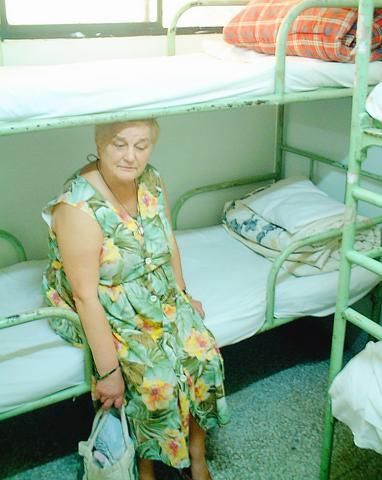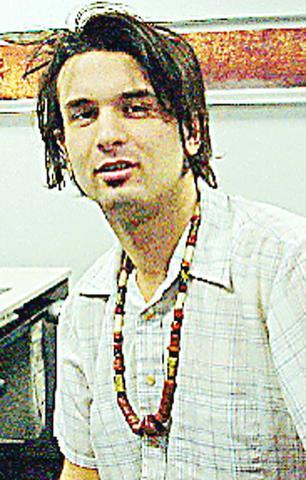From the top of the Catholic hostel in Tienhsiang you can just make out the confluence of two rivers far below; one trickles down the shoulder of a mountain to the east and the other rushes in from the west. The sound of their meeting is a hush of white noise that makes anything else in this canyon hard to hear. But another two forces are colliding now and creating a noise of their own. A mother whose son disappeared here five months ago has come from the US intent on finding him -- and local law enforcement authorities have little to offer her but green tea and unspoken
condolences.

PHOTO: DAVID MOMPHARD, TAIPEI TIMES
Frederyk Frontier came to Taiwan to begin a job teaching English with Hess Educational Organization. He was last seen on May 23, three days after his arrival. Two weeks later, the American Institute in Taiwan placed an all-points bulletin for Frontier through the National Police Administration (NPA) and his mother, Barbara Klita, came some weeks later to help authorities locate him. She stayed for the first weeks of an investigation that would turn up little in the way of leads, then returned to Alaska on Sept 1.

Now Klita has come back to this resort town at the head of Taroko Gorge, Hualien, where her son was last seen, to kick-start an investigation that has stalled since she was last here.
"I will find my son. The police are no good. They've done nothing and they tell me nothing. They have only secrets," she says with a glare. She speaks with a Polish accent. She has a shock of close-cropped, bright yellow hair. She's a bundle of energy always carrying a bag full of leads she says the police haven't followed up on. And she has a five-year visa.
NO SIMPLE SOLUTION
At a cursory look, Fred's case would seem to be open-and-shut: An adventure-loving young man hikes out into the precarious mountain wilderness and disappears. Most of the trails in Taroko National Park are scratched into the side of a mountain and lined with dense foliage; step off the path and you fall off a cliff.
But there is more mystery involved in Fred's case than where he might be and it revolves around a small backpack. Fred checked into Tienhsiang's Catholic hostel on May 22, telling the proprietors that he planned to stay three days. The proprietors later told police that they say saw him leaving the next morning, carrying a small backpack. That was the last reported sighting of him.
Ten days later Fred's backpack turned up under a table in the hostel recreation room. Not knowing who it belonged to, the proprietors took it to the neighboring police station but were told to hold on to it in case its owner came looking for it. During the investigation months later, however, the two people staying in the same dormitory room with Fred told police that they remembered seeing the bag and that it remained on Fred's bed for several days, contradicting what the proprietors told police.
If the testimony of the two hostel guests is accurate, how did the bag get from Fred's bed to the adjacent recreation room? If the proprietors were correct in remembering Fred to have left with the bag the day he disappeared, how did it find its way back to the hostel?
The questions regarding the backpack are a source of never-ending frustration for Klita, and the police, she says, have been useless in answering them. "I can sleep," she says, "but when I wake up the nightmare begins again." All indications are that when she returned to the US, Fred's case folder only gathered dust.
Before he had even arrived in Taiwan, Frontier had posted two responses on a local Web site to women interested in meeting men. The site's administrator says no one from the NPA has contacted him to follow-up on the potential lead. The 1,400 missing-person notices Hess had printed and hung have all but disappeared. One of the posters hangs in the police station in Tienhsiang, pinned on top of other notices dated the week before Klita's arrival. About the same time that poster was re-hung, Hualien County police asked for a copy of an article about Fred's disappearance that ran in the Taipei Times a month earlier.
`best behavior'
"When I was here in the summer, they would only drink liquor and smoke and eat [betel nuts]," Klita said of the police. But they're on their best behavior now. They've gathered each evening since Klita's return and treated her to dinner. They wear ironed polo shirts and sip green tea. And since her return (or perhaps because of it), Fred's case has changed from a missing-person investigation to a criminal investigation, a change authorities previously weren't willing to make without evidence of wrongdoing. But NPA officials won't say if they've uncovered new evidence.
MOTHER KNOWS BEST
For her part, Klita is adamant that there was wrongdoing involved. She claims that Chinese mafia abducted her son to get his US passport -- it remains unaccounted for -- that they had been tailing him since he arrived at the airport and were waiting for the right time to grab him.
"I'm afraid they hurt Fred," she says. "They wanted his American passport. It's worth US$25,000 on the black market."
She claims that the two men who stayed at the hostel at the same time as Frontier are likely the ones responsible for his disappearance. To support her theory, she cites the mystery behind Frontier's backpack and the fact that a hundred-man search of the area turned up nothing.
On her first visit here, she saw someone at the Tienhsiang Youth Center whom she believes to be one of those two men. "He hid his face behind a newspaper when I came through the building with police. Then he moved the newspaper and I saw his face. It was the face of a criminal."
Of course, that was two months after Frontier had disappeared and police say they had already interviewed the other two hostel guests. She says her maternal instinct tells her the man is guilty. "I'm Fred's mother," she said. "I could see in his eyes he hurt my son."
No one from the NPA or the Hualien County police was willing to go on record for this report, but some privately spoke of their incredulity with Klita's assumptions. "He likely walked off on some mountain trail and slipped," said more than one official.
Like the rivers that meet beneath Tienhsiang, Klita and the police will each run their course. The latter may have been content to trickle along, but Klita, rushing in from the west, has swept them into a torrent and made herself heard. Now it's hard to hear anything else in Taroko Gorge.

Under pressure, President William Lai (賴清德) has enacted his first cabinet reshuffle. Whether it will be enough to staunch the bleeding remains to be seen. Cabinet members in the Executive Yuan almost always end up as sacrificial lambs, especially those appointed early in a president’s term. When presidents are under pressure, the cabinet is reshuffled. This is not unique to any party or president; this is the custom. This is the case in many democracies, especially parliamentary ones. In Taiwan, constitutionally the president presides over the heads of the five branches of government, each of which is confusingly translated as “president”

By 1971, heroin and opium use among US troops fighting in Vietnam had reached epidemic proportions, with 42 percent of American servicemen saying they’d tried opioids at least once and around 20 percent claiming some level of addiction, according to the US Department of Defense. Though heroin use by US troops has been little discussed in the context of Taiwan, these and other drugs — produced in part by rogue Chinese Nationalist Party (KMT) armies then in Thailand and Myanmar — also spread to US military bases on the island, where soldiers were often stoned or high. American military policeman

An attempt to promote friendship between Japan and countries in Africa has transformed into a xenophobic row about migration after inaccurate media reports suggested the scheme would lead to a “flood of immigrants.” The controversy erupted after the Japan International Cooperation Agency, or JICA, said this month it had designated four Japanese cities as “Africa hometowns” for partner countries in Africa: Mozambique, Nigeria, Ghana and Tanzania. The program, announced at the end of an international conference on African development in Yokohama, will involve personnel exchanges and events to foster closer ties between the four regional Japanese cities — Imabari, Kisarazu, Sanjo and

The Venice Film Festival kicked off with the world premiere of Paolo Sorrentino’s La Grazia Wednesday night on the Lido. The opening ceremony of the festival also saw Francis Ford Coppola presenting filmmaker Werner Herzog with a lifetime achievement prize. The 82nd edition of the glamorous international film festival is playing host to many Hollywood stars, including George Clooney, Julia Roberts and Dwayne Johnson, and famed auteurs, from Guillermo del Toro to Kathryn Bigelow, who all have films debuting over the next 10 days. The conflict in Gaza has also already been an everpresent topic both outside the festival’s walls, where